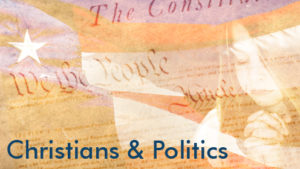 I’ve never been a utopian when it comes to politics. I’ve always known heaven won’t be created on earth. Yet, along with that realization, I’ve maintained a commitment to instilling Biblical values into politics as much as possible. When government follows policies based on Biblical principles, I believe we get closer to the ideal, regardless of the pervasive sinfulness of men.
I’ve never been a utopian when it comes to politics. I’ve always known heaven won’t be created on earth. Yet, along with that realization, I’ve maintained a commitment to instilling Biblical values into politics as much as possible. When government follows policies based on Biblical principles, I believe we get closer to the ideal, regardless of the pervasive sinfulness of men.
This past political season was a jolt to my hopes. Faced for the first time with two candidates for president who never should be allowed close to the Oval Office, I had to go another route with my vote. My conscience constrained me.
What bothered me most was what I consider a nearly wholesale abandonment of principle by those who call themselves conservatives, and even worse, those who are my fellow Christian believers who ultimately decided that principles no longer mattered in this situation.
Note: this is not an indictment of many who struggled with their consciences and voted for Trump because they couldn’t imagine the alternative. My concern is with those who have become unapologetic apologists for a man regardless of what he says or does.
 Yesterday, I read a column by Erick Erickson that echoed what I’ve been feeling. I’m going to share some of his pertinent comments and intersperse mine. Erickson feels betrayed by politics and by those he thought were his spiritual/intellectual companions. He says that, although he’s always been a Republican, he no longer has a home in that party.
Yesterday, I read a column by Erick Erickson that echoed what I’ve been feeling. I’m going to share some of his pertinent comments and intersperse mine. Erickson feels betrayed by politics and by those he thought were his spiritual/intellectual companions. He says that, although he’s always been a Republican, he no longer has a home in that party.
I understand how he feels.
On the right, a party that used to be centered around the idea of smaller government and individual empowerment is instead captured by its own personality that centers around a strong man in Washington and whatever he wants.
I have argued for a constitutional understanding of government for more than thirty years. I thought Republicans, on the whole, agreed with that perspective. Instead, I’m seeing far less concern for that now that “we” have a supposedly strong man in power.
Erickson then addresses the Christian community that has sought, like I have, to return Biblical principles into our governing (especially after the ill effects of the Obama tenure):
Christians are supposed to find some peace in the world by knowing that there is a last day and they are on the winning team. But right now a bunch of American Christians are looking to political solutions for spiritual problems and convincing themselves they’re making a Heaven on earth. . . .
So many people going to church on Sunday looked at Trump and called him a Cyrus, but increasingly this looks like a Maccabean revolt. Sure, they threw out those they saw as pagans and set about purifying temple America, but things did not exactly go well for the people or the kingdom thereafter.
Of course it was all downhill to Herod and the first coming, so maybe it’ll all be downhill from here to the second coming. That increasingly looks likely as the world goes mad, this country included.
Hyperbole? Not from where I’m sitting. That’s my perception also.
 He then switches to what he would like to see in politics; I’ll share a few of his dreams:
He then switches to what he would like to see in politics; I’ll share a few of his dreams:
I want a new party, and a conservative one where conservatism is not defined by beating the other side, but by pursuing the best policies.
I want a party that is pro-family and structures the tax code accordingly and fights for school choice so parents can get their kids educated instead of indoctrinated.
I want a party that is pro-life and that does not run from the Bible.
I want a party that does not define people by the color of their skin or where their families came from, but sees us all as part of the American experiment.
And I want a party that is beholden to ideas, not men.
I will add my “amen” to all of that. And with Erickson, I can also say that I, at one time, thought that existed. Now I’m not so sure. You see, I’ve not changed, but my party has. Ronald Reagan used to say that he hadn’t changed, but that the Democrat party he had always been a part of was the one that moved away from his beliefs.
What happened to a conservatism that was based on ideas, not nationalism? Caring for one’s nation is good, but there is a line that can be crossed. When does one’s devotion to the nation become a substitute for devotion to God?
Here’s one more short paragraph from Erickson’s piece that resonates with me:
To the extent that I have changed, though, I think I have changed for the better. I have a harder time reconciling my faith to my politics and see so many of my friends trying to squeeze their faith into their politics. I would rather go the opposite way and connect my politics to my faith, giving up those things that cannot be reconciled.
 One of the key concepts I’ve tried to communicate to students, and to anyone else who will listen to me (I guess that’s why I write this blog) is that you start with Scripture and then make everything align with that. You never start with what others say is true and then do your best to inject Scripture into it, thereby making a false attempt to Christianize something that is not Christian at all.
One of the key concepts I’ve tried to communicate to students, and to anyone else who will listen to me (I guess that’s why I write this blog) is that you start with Scripture and then make everything align with that. You never start with what others say is true and then do your best to inject Scripture into it, thereby making a false attempt to Christianize something that is not Christian at all.
I’m going to continue on the path of making God’s truth my cornerstone. I will not bow to the political gods who say I should set my Biblical principles aside for the sake of a few Supreme Court justices or some temporary victories via executive orders.
I want to look back on my decisions and not experience deep regret over my subordination of God’s ways to man’s ways. He calls us to be faithful, and that is what I intend to be.
